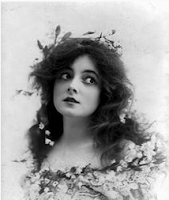HAPPY BIRTHDAY, MARIE DORO
(May 25, 1882 - October 9, 1956)
A direct descendant of Patrick Henry, Mary Katherine Stuart, was born in Duncannon, Pennslyvania where her father was a prominent Wall Street lawyer. Her stage name Doro is a contraction of the nickname "Adorato," by which her family knew her. She was preparing for Vassar College when she persuaded her father to let her try for the stage.
In 1901 she made her stage debut in a stock company in St. Paul, Minnesota. Two years later she debuted in New York in The Billionaire. Producer and manager Charles Frohman discovered her and groomed her for stardom. Future engagements included: J. M. Barrie's The Admirable Crichton (1904), produced by William Gillette's company; title role in Gillette's Clarice (1905) and a revival of his Sherlock Holmes in 1906.
She also starred in Gillette's Electricity (1910) and the highly praised revival of Oliver Twist, playing the lead role. She claimed that Oliver was her favorite role, her delicate frame and soulful eyes made her perfect for the part. In London she appeared in Victorien Sardou's Diplomacy opposite William Gillette. They were rumored to be romantically inclined, but insisted they were just friends.
On a tour of England, she acted with the unknown teenaged Charlie Chaplin who was besotted with her. Later, when he was famous, they met in America, but she had to confess that she had no memory of him.
She was a Dresden doll-like brunette, described by drama critic William Winter as "a young actress of piquant beauty, marked personality and rare expressiveness of countenance." Offstage she was intelligent, an expert on Shakespeare and Elizabethan poetry, and possessed a penetrating humor and an occasional acid wit.
Charles Frohman's death on the Lusitania in 1915 ended her stage career until 1921 when she appeared on Broadway with Josephine Drake in Lilies of the Field. She made 18 silent films starting in 1915 when she was under contract to Adolph Zukor's Famous Players. Few survive. By the early 1920s she became increasingly disillusioned with Hollywood and her acting career. She relocated to Europe and made a number of films in Italy and the UK. And when she returned to America, she became increasingly reclusive and drawn to spiritual matters.
Her technique of practicing subtle nuances of facial expression in a mirror to prepare for her roles served her well as a silent screen actress.
Marie Doro was awarded unusual honors during her career. She was the first American actress to give a command performance at Windsor Castle. She played in Diplomacy before England's royal family in 1914. She was the first American to be awarded the Legion Commandatora, given by King Victor of Italy in 1920.
In the course of a twenty year career, she rose in critical esteem from a professional beauty and dilettante to a major dramatic star, holding her own in the company of such actresses as Mrs. Fiske, Ethel Barrymore, and Laurette Taylor. The New York Times Review of Oliver Twist described her as "a lovely and sympathetic little Oliver." (2/27/1912). Another reviewer declared after seeing her in Barbara "By some magic, her girlish prettiness and charm have been touched with the flame of real beauty--a beauty that is as compelling as it is exquisite and unaffected." (November 6, 1917).
References: Wikipedia, Notable Women in the American Theatre, 1989 edition



No comments:
Post a Comment